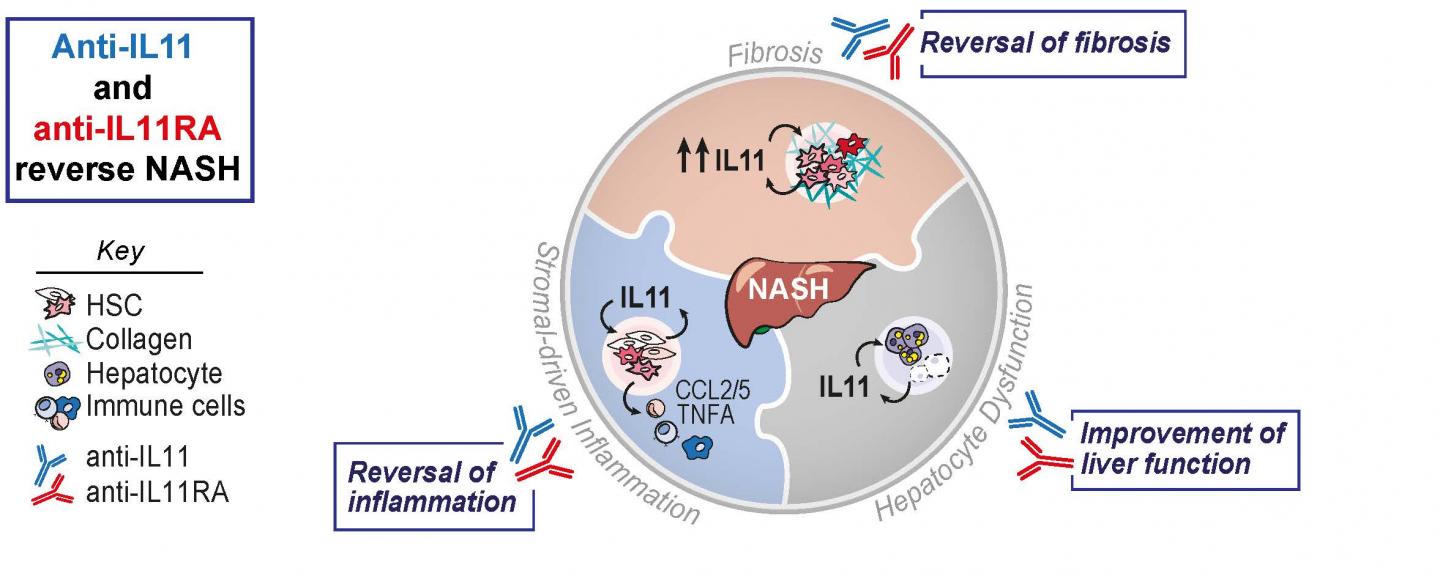
Credit: Dr. Eleonora Adami, Duke-NUS Medical School
A team of researchers led by Duke-NUS Medical School and National Heart Centre Singapore (NHCS) found that deactivating a specific protein ? interleukin 11 (IL11) – with drugs called therapeutic antibodies, reverses inflammation and scarring of the liver in patients suffering from an untreatable type of fatty liver disease called non-alcoholic steatohepatitis (NASH). The findings,1 published in the top journal for liver and gut diseases, Gastroenterology, have implications for the development of drugs to treat the disease.
Fatty liver disease is very common in Singapore and affects approximately one in four people around the world. People with diabetes and obesity are particularly at risk. Fatty liver disease can progress to cause liver inflammation, fibrosis and NASH, which increases the risk of liver failure. There is currently no treatment for fatty liver disease and NASH, and drugs tested in patients thus far have failed to work.
“We questioned whether the IL11 protein is important for fat accumulation, scarring and inflammation of the liver due to the overconsumption of fatty food and sugary drinks. Our team found that this protein is very important for these processes, and inhibiting it can not only prevent fatty liver disease but also reverse it after it has taken hold of the liver,” said Dr Anissa Widjaja, Senior Research Fellow at Duke-NUS’ Cardiovascular and Metabolic Disorders (CVMD) Programme and first author of this study.
The team found that the IL11 gene triggers the development of NASH and fat accumulates in the livers of people with the condition. It is most common in people who are obese and diabetic, and causes fatigue, abdominal pain, itchy skin, nausea, and can ultimately lead to liver cirrhosis or cancer.
The therapeutic antibodies developed by Duke-NUS and NHCS researchers inhibited IL11 in a pre-clinical model that mimicked the human form of NASH, preventing and reversing liver inflammation, and even leading to lower blood levels of cholesterol and glucose.
“Millions of people are affected by diabetes and dangerous fatty liver disease – we have identified a new approach to treat these patients and restore their liver function, while lowering the dangerous fats and glucose in their blood,” added Professor Stuart Cook, corresponding author of the study, who is the Tanoto Foundation Professor of Cardiovascular Medicine and Director of the CVMD Programme at Duke-NUS, Senior Consultant at NHCS, and Director and Co-Founder of Enleofen Bio, a biotechnology company established in Singapore that is now developing the antibody therapeutics for clinical trials. The company aims to have the drugs ready for clinical trials by the end of 2020.
###
Media Contact
Lekshmy Sreekumar
[email protected]
Related Journal Article
http://dx.




